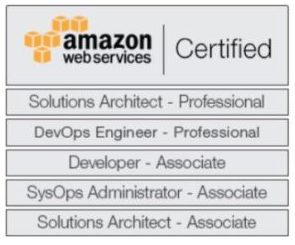By Petar Marinkovic, IOD Senior Expert and Mentor
 When you are a freshly employed junior in IT, a few certification acronyms look nice on your CV. You don’t have too many projects under your belt, so passing a couple of Microsoft, Cisco, or AWS exams will definitely help you in pursuing and obtaining positions that will kickstart your career. But, when should you stop? When is enough enough? And once you’ve decided it’s enough, and you have more free time, what’s the best way to spend that time in a way that will support your continued growth?
When you are a freshly employed junior in IT, a few certification acronyms look nice on your CV. You don’t have too many projects under your belt, so passing a couple of Microsoft, Cisco, or AWS exams will definitely help you in pursuing and obtaining positions that will kickstart your career. But, when should you stop? When is enough enough? And once you’ve decided it’s enough, and you have more free time, what’s the best way to spend that time in a way that will support your continued growth?
I have to admit, I was a member of the “certification” cult.
It all started innocently enough. I was a CS student, with a major in Networks, and during my last year of university, we received vouchers for Cisco exams.
I was already working at the time, as a junior sysadmin, and to be honest, I wasn’t quite happy with my job. The job itself wasn’t bad, but it was everything you would expect from a junior sysadmin position: reinstall PCs, work on an already-predeployed Active Directory environment, and maintain a small network that rarely changes. I wanted to transition into something new, but with less than a full year of experience in mostly desktop support, my only options were to do more desktop support, or to pursue a career of a junior software developer, since I already completed some Java programming internships.
But, at the time, the idea of working again with J2EE and Tomcat didn’t seem fulfilling to me. So, I turned to Cisco, passed CCNA quite fast, and put it on my CV. I applied for a couple of jobs, got almost no replies, and so it seemed CCNA alone wouldn’t cut it. Since I was already working quite a lot with AD, Windows Server 2003, and other MS enterprise technologies, getting a Microsoft certification was a logical next step. After seven not-so-difficult, but also not-so-interesting exams, the MCSE badge was on my resume. Soon, offers started to come my way!
When I went on to my next job, I got acquainted with VMware. And on the job after that one, I became experienced with Linux and RHCSA, and the journey continued. Every new job gave me a new challenge, and I continued attending more courses and passed more certification exams. Certainly my hands-on knowledge was growing—since everything I learned in the courses I had the chance to apply and deploy in on-the-job situations—but, I also had to suffer through studying completely irrelevant information in order to pass an exam. Do you really need to know the maximum number of VMs you can run under one VMware ESXi 5.0 host? And how much higher that number is in ESXi 5.1? How helpful is it really to know how to set up a Samba server in RHEL 6 in the shortest time possible, when you know that you aren’t going to deploy it in your real-life work?
Sound familiar?
Like me, you’ve probably realized—or will soon realize— that certification exams are quite standardized, and they don’t truly assess your technical knowledge, but more your ability to do tests. So just because you have passed a test, doesn’t mean you walk away with the practical knowledge of that subject.
Are you thinking, “Yes, but recruiters look for and value certifications?” That’s true. They definitely do. But, after you get your foot in the door, and pass the first hurdle (the recruiter), you’ll have an interview with a senior engineer or, more likely, the line manager. And at that point, it won’t matter much how many exams you passed if you don’t actually know in detail what you actually studied for those exams.
So how can you know when enough is enough? No one can tell you that, but at some point in your professional IT career, you will start to feel confident with your knowledge and your skillset and you will realize that you don’t need a bunch of acronyms under your LinkedIn profile to impress recruiters and future bosses. I stopped at 13. (I should add that the last ones were AWS certifications, which I highly recommend.)
Today, as a senior IT professional, and having a proven track in leading various implementation projects, as well as managing engineering teams, I would advise my 20-year-old self in this way: When you start your career, it’s smart to pursue a couple of certification exams. Passing exams will improve your self esteem, boost your CV, and give you an idea of which technologies you actually find interesting. This last part is perhaps the most important these days since in today’s world of cloud, containers, DevOps, and agile development, there are so many areas that you can research as a junior IT employee. Read up, spin up test labs, play around with some programming languages, such as Python or Ruby and see what makes your mind happy and occupied. When you’ve found your inspiration, check what’s available from certifications in those areas, and get one or two, just to put yourself on the map of IT recruitment.
At that point, you should shift your focus to other skills that you shouldn’t neglect, such as writing, community building, and public speaking. Use your earned knowledge to start a blog, develop your presentation skills, and show the world what you have learned. Participate in GitHub projects, subscribe to subreddits, and maintain an active Quora profile. With these steps, especially with blogging, you won’t just expand your technical knowledge, you will also improve your research skills. After a while, you’ll realize that while you spend time sharing what you know with other people, you will also learn new things along the way from them! As a final note, never forget what Gandhi said, “Live as if you were to die tomorrow. Learn as if you were to live forever.” IT is all about learning, and trust me, you have just started your journey. There is still a long way ahead.
Are you interested in becoming an IOD expert? Do you have knowledge you want to share? Do you want to research and get paid for it? Apply now.

